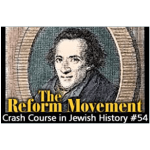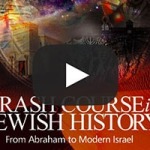History Crash Course #40: Seeds of Christianity
The century and half that follows the completion of the Mishna corresponds to period in history when the Roman Empire adopts Christianity. The empire’s “conversion” from paganism to Christianity will have a severe impact on the Jews. However, before we tell that story, we must go back in time to the 1st century C.E., when the Temple still stood.
As we might recall that from the time of the invasion of the Romans and particularly following the persecutions of the sages by King Herod, the Great, the Jewish people were in turmoil. Soon nationalistic feelings would erupt in the Great Revolt (67-70 C.E.) and the Jews would be fighting the Romans as well as each other.
In this atmosphere of tension ― when the Jewish people were yearning for a leader who would help them throw off the Roman yoke ― the seeds of what would later become Christianity were first sown.
Messiah
When Jews yearn for a savior, they are yearning for the Messiah.
It is important to realize that the notion of the Messiah was not invented by Christianity. It is an ancient Jewish idea ― one of the “13 principles of faith” within Judaism[1]The Thirteen Principles are based on the teachings of Maimonides (1135-1204) and encompass the basic philosophy of Judaism. Point number twelve states: .” I believe with complete faith in the … Continue reading. It is recorded numerous times in the various books of the prophets, including Isaiah, Michah, Zephaniah, and Ezekiel.
(Indeed throughout Jewish history, strong leaders arose and for a time where mistaken for the Messiah. But when the Messiah did not fulfill the prophecies ― by bringing world peace etc. ― it became clear he was not the Messiah.)
The English word Messiah, comes from the Hebrew word mashach which means “to anoint.”[2]A description of the anointing oil is found in the Book of Exodus (30:22-30): God spoke to Moses saying: “ Now, take for your self choice spices:…pure myrrh, fragrant cinnamon,…fragrant … Continue reading The Mashiach then, is God’s “Anointed One.” This, for example, is how the Book of Samuel relates the anointing of David as king:
Samuel took the horn of oil and anointed him [David] in the midst of his brothers, and the spirit of God rested on David from that day on. (1 Samuel 16:13)
Throughout the Bible we see numerous examples where God would designate individuals for kingship by sending a prophet to anoint them with oil. While numerous personalities in the Bible are called “anointed,” there is only one who is called THE anointed-The messiah. The Jewish definition of Messiah is a Jewish leader (without question, a human being), descended from the line of King David (that is, from the tribe of Judah) who will have the Torah knowledge and the leadership ability to bring all the Jewish people back from exile to the Land of Israel. He will rebuild the Temple, bring world peace, and elevate the entire world to the realization of one God.
(For Jewish sources for these points in the order listed above see: Genesis 49:10; Deut. 17:15; Numbers 24:17; Genesis 49:10; 1 Chronicles 17:11; Psalms 89:29-38; Jeremiah 33:17; 2 Samuel 7:12-16; Isaiah 2:4; ; Isaiah 11:1-12; Isaiah 27:12-13; Isaiah 40:5; Micah 4:1; Micah 4:3; Zephaniah 3:9; Ezekiel 37:24-28.)
Based on traditions taken from the oral law, the great medieval scholar Maimonides gives us a concise definition of the messiah:
The King Messiah will arise and restore the kingship of David to its former state and original sovereignty. He will rebuild the sanctuary and gather the dispersed of Israel. All the ancient laws will be re-instituted in his days… Do not think that the King Messiah will have to perform signs and wonders, bring anything new into being, revive the dead, or do similar things. It is not so…
If there arise a king from the House of David who meditates in Torah, occupies himself with the commandments… observes the precepts prescribed in the Written and Oral Law, prevails upon Israel to walk in the way of Torah… fights the battles of the Lord, it may be assumed that he is the messiah. If he does these things and succeeds, rebuilds the sanctuary on its site, and gathers the dispersed of Israel, he is beyond all doubt the Messiah. He will prepare the whole world to serve the Lord together.[3]Maimonides Mishna Torah; Laws of Kings, Chap. 12.
The Prophet Isaiah, whose prophecy on this subject is perhaps the best known, describes the Jewish Messianic Vision with these words:
In the days to come, the Mount of God’s House shall stand firm above the mountains and tower above the hills. And all the nations shall stream to it. And the many peoples shall go and say: “Come, let us go up to the Mount of God, to the House of the God of Jacob ― that He may instruct us in His ways, that we may walk in His paths.” (Isaiah 2:3)And they shall beat their swords into plowshares and their spears into pruning hooks; nation shall not lift up sword against nation. Neither shall they learn war anymore… (Isaiah 2:4)
[At that time] the wolf shall dwell with the lamb, the leopard lie down with the kid, the calf and the beast of prey shall feed together with a little child to herd them. (Isaiah 11:6)
Since the notion of a person who will redeem the Jewish people is a fundamental, philosophical part of the Jewish worldview, it is not surprising that the expectation of that redemption always appears at times of crisis.
Indeed, the sages say that the Messiah will be born on the 9th of Av, the worst date in the Jewish calendar when the worst disasters (destruction of the First and Second Temples as well as the fall of Beitar in 135 C.E.) befell the Jewish people.
The Book of Ezekiel, for example, talks of a final showdown ― the War of Gog and Magog ― a terrible war when all the nations turn against the Jews.[4]See: Ezekiel 38: 1-16; Zechariah 12:1-3. According to one possible scenario, this is when the Messiah is expected to come and bring final redemption.
This is why, when times are very bad, the Jewish people are prone to think that the final showdown is now. It’s always darkest before the dawn-It looks like things couldn’t get worse. If so, the Messiah must be right around the corner.
Dark Time
The Roman occupation was such a dark time in Jewish history. Some of the most brilliant of the rabbinical sages had been murdered by Herod. Corruption had crept into the Temple hierarchy. Jews had split into three major groups:
- the wealthy Sadducees (many of them were Cohanim ― the priestly families), who denied the authority of the Oral Law, pledging allegiance to Rome;
- the fanatically religious and nationalistic Zealots ready to battle Rome to the death in a suicidal war; and
- the mainstream Pharisee majority, still loyal to Torah and Oral Law, caught in between.
Out of this chaotic time ― marked by virulent anti-Semitism and cruel oppression of the Jews ― were born a number of splinter sects, whose members believed that the Apocalypse was at hand. Finding a receptive ear among the disfranchised, these sects preached that the ultimate battle of good versus evil would soon be fought, followed by the Messianic redemption of humanity.
The Dead Sea Sect ― which became famous in modern times after the discovery of the Dead Sea Scrolls in Qumran, and which may or may not have been associated with the Essenes ― was one such sect, but there were many others.
The teachings of these sects did not catch on in any significant way among the Jews. In the same way that the Jews usually rejected foreign religions, they also rejected attempts to tamper with the inner workings of Judaism.
Nevertheless, at this tumultuous time, the Jews were more susceptible than ever before. The countryside was alive with charismatic healers and preachers, and people flocked to them hoping to hear prophecy that the years of strife and suffering were at an end.
The one who would become most legendary, was Joshua, or Jesus, who later in history came to be called Christ, which is Greek for Messiah.
It is outside of this book to describe the beginnings of early Christianity under Jesus. Currently, there exist approximately 2,700 books in print on the subject, many of them written in recent years discussing the issue of the historical Jesus vs. the legendary Jesus, and debating what he said or did not say and what can be said of him with any certainty.
(For those interested, one good source is a highly readable book by the award-winning British biographer A. N. Wilson, Jesus: A Life, which thoroughly analyzes all the data and throws in a fair amount of fascinating speculation as well.)
Historically speaking, very little is known. The authors of the Gospel, beginning with Mark c. 60 C.E., all lived after the accepted date of Jesus’ death (c.34 C.E.) There are several references in the Talmud to various personalities of whom the rabbis disapproved and some have speculated that one or more of these references are to Jesus. The closest possibility is Yeshu HaNotzri[5]Although Yeshu sounds like Yeshu and Notzri is the modern Hebrew word for Christian, the connecting Yeshu to Jesus is very problematic especially since some authorities consider the name Yeshu to be … Continue reading), but there are several problems with this idea: First, there are at least two characters in the Talmud with the name Yeshu HaNotzri. Second, according to Jewish chronology, these two individuals lived about 300 years apart and neither lived at the time of Jesus. The first Yeshu lived at the time that Joshua Ben Perachyah led the Sanhedrin (circa 150 BCE) and, therefore, predated Jesus according to Christian chronology by at least 150 years. The second Yeshu lived sometime during the second century C.E. about 100 years after the death of Jesus. Finally, the limited narrative we do find in the Talmud[6]It is important to mention that these references (see: Talmud, Sanhedrin 43a & 67a; Sotah 47a) are not found in most modern editions of the Talmud. In medieval Europe and during the Renaissance, … Continue reading about Yeshu does not match anything from the Gospel.
One would expect ― if Jesus was at all influential in his time – that the great Jewish historian Josephus (c. 38 – c. 100 C.E.) would have devoted considerable space to him. In all of Josephus’s writings there is but one mention of Jesus (Josephus, Antiquities, 18:3:3.) and this single reference is considered by virtually all scholars to have been an insertion into the original text-added later by Christian monks who copied such texts for church libraries.[7]The most likely author of this reference is Eusebius, the 4th century Bishop of Caesaria. The reason for such an insertion into the text is obvious. The lack of any mention in Josephus (who misses … Continue reading
The best we can say with certainty is that the Christian world does agree that Jesus was a Jew who was familiar with the Torah, observed the “Law of Moses” and taught many of its precepts, though he also departed from some of them.
One of the most famous of his teachings consists of two Torah quotations that were staples of Judaism and echoes the emphasis of the rabbinic teachings of his era. Asked to name the greatest commandment, Jesus, as cited in the Gospel of Matthew (22:37-40), replies:
Love the Lord your God with all your heart and with all your soul and with all your mind. This is the first and greatest commandment. And the second is like it. Love your neighbor as yourself. All the law and the prophets hang on these two commandments.
“Love the Lord your God with all your heart and with all your soul and with all your might” is a quotation from Deuteronomy 6:5. “Love your neighbor as yourself” is from Leviticus 19:18. These teachings predated Jesus by some 1,300 years.
As already mentioned, the Gospels, which are said to record what were the teachings of Jesus were written in Greek many years after his death (which, incidentally, Christian sources give as c.34 CE or some 35 years before the destruction of the Temple.)
Jewish Followers of Jesus
Who were the Jewish followers of Jesus?
The members of the Jesus sect were clearly religious Jews who believed that Jesus was the Messiah. They could not have believed that Jesus was “god” and remained Jewish, as such a belief would have been complete idolatry in Jewish eyes and would have appeared closer to the Greco-Roman pagan beliefs where gods took on human form and had relations with humans.
(Indeed, the concept of “son of God” appears later in Christian theology, though the gospels make much use of the term “son of Man” which is taken from the writings of the prophets and is sometimes used to refer to the prophet himself.)
At any rate, the Jesus sect, like numerous other sects in the Land of Israel, would certainly have died out even if its members had survived the revolts against Rome in the first and second centuries. (The Pharisees[8]Pharisidic Judaism survived and eventually evolved into the Orthodox Judaism of today. survived in part due to the vision of their leader, Rabbi Yochanan ben Zakkai as we saw in chapter ?)
So where did all the Christians comes from? Indeed, where did Christianity come from?
For the answer, we must look at another colorful personality who appeared on the scene after the death of Jesus, and who is given the credit by virtually every historian of Christianity for spreading the message of Jesus worldwide, if not fashioning Christianity for the consumption of the pagan world.
He was a Jew ― originally known as Saul ― who became famous in Christianity as “Saint Paul.”
References
| ↑1 | The Thirteen Principles are based on the teachings of Maimonides (1135-1204) and encompass the basic philosophy of Judaism. Point number twelve states: .” I believe with complete faith in the coming of the Messiah, and even though he may delay, nevertheless I anticipate every day that he will come.” |
|---|---|
| ↑2 | A description of the anointing oil is found in the Book of Exodus (30:22-30): God spoke to Moses saying: “ Now, take for your self choice spices:…pure myrrh, fragrant cinnamon,…fragrant cane;…cassia…and a hin of olive oil Of it you shall make oil of sacred anointment. With it you shall anoint the tent of Meeting (Tabernacle) and the Ark of the Covenant…You shall anoint Aaron and his sons and sanctify them to minister to me.” |
| ↑3 | Maimonides Mishna Torah; Laws of Kings, Chap. 12. |
| ↑4 | See: Ezekiel 38: 1-16; Zechariah 12:1-3. |
| ↑5 | Although Yeshu sounds like Yeshu and Notzri is the modern Hebrew word for Christian, the connecting Yeshu to Jesus is very problematic especially since some authorities consider the name Yeshu to be nickname and not the name of a real person. (References to the name Yeshu can be found in: Talmud, Brachot 17b; Sanhedrin 43a & 103a; Rashi in Brachot 12b; Rashi in Rosh HaShanah 17a; Rashi in Yoma 40b |
| ↑6 | It is important to mention that these references (see: Talmud, Sanhedrin 43a & 67a; Sotah 47a) are not found in most modern editions of the Talmud. In medieval Europe and during the Renaissance, the Talmud was subject to censorship and on several occasions it was publicly burned. When the printing press was invented (1453) the Christian printers, who printed the Talmud, printed only the censored versions. Anything perceived as anti-Christian/anti-Gentile was left out. Today, even though no such censorship exists, these passages have, in most editions, not been re-inserted back into the text of the Talmud. There is a small book entitled Chesronot HaShas (“That Which is Missing from the Talmud) which contains all the missing parts of the Talmud. |
| ↑7 | The most likely author of this reference is Eusebius, the 4th century Bishop of Caesaria. The reason for such an insertion into the text is obvious. The lack of any mention in Josephus (who misses nothing) was very problematic for Christianity. Eusebius inserted a short reference to Jesus in the text of Josephus’s Antiquities to cover up this glaring absence. |
| ↑8 | Pharisidic Judaism survived and eventually evolved into the Orthodox Judaism of today. |










